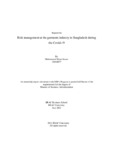| dc.contributor.advisor | Majumdar, M. Nazmul Amin | |
| dc.contributor.author | Imam, Muhammad Hasan | |
| dc.date.accessioned | 2021-11-01T04:45:47Z | |
| dc.date.available | 2021-11-01T04:45:47Z | |
| dc.date.copyright | 2021 | |
| dc.date.issued | 2021-07 | |
| dc.identifier.other | ID: 18164077 | |
| dc.identifier.uri | http://hdl.handle.net/10361/15584 | |
| dc.description | This internship report is submitted in partial fulfillment of the requirements for the degree of Masters of Business Administration, 2021. | en_US |
| dc.description | Cataloged from PDF version of internship report. | |
| dc.description | Includes bibliographical references (page 45). | |
| dc.description.abstract | Bangladesh was once recognized as the "bottomless basket." It has now set up itself as a land of miracles. When the major exporting commodity, golden jute, began to lose its shine, the garments industry stepped in to fill this gap. After China, we are now the second-largest clothing exporter with a high brand value named Made in Bangladesh. However, it is a matter of great regret that incidents like Rana Plaza and Tazreen Fashion have exposed us to international criticism. Bangladesh lacks the proper laws and regulations to reduce any risks that might endanger the country's future glory. There are different kinds of risks that may create problems during the Covid-19 like financial risk, supply chain risk, operational risk, and technological risk, etc. The garment workers are the ones who suffer the most because of the Covid-19. The owners began to lose work orders, and they were unable to pay their credit. To avoid such risks, the owners have no savings. They were too busy to make personal assets in different countries around the world, not minimizing risk. Even the owners are involved in many types of criminal activity such as tax evasion, excessive imports, and money laundering. The government is attempting to combat this risk by providing a stimulus package. Hiring experienced management, reforming the BGMEA's responsibilities, and creating strong trade unions are all effective ways to reduce this risk. | en_US |
| dc.description.statementofresponsibility | Muhammad Hasan Imam | |
| dc.format.extent | 45 Pages | |
| dc.language.iso | en_US | en_US |
| dc.publisher | Brac University | en_US |
| dc.rights | Brac University Internship reports are protected by copyright. They may be viewed from this source for any purpose, but reproduction or distribution in any format is prohibited without written permission. | |
| dc.subject | Risk Management | en_US |
| dc.subject | Covid-19 | en_US |
| dc.subject | Impact | en_US |
| dc.subject | RMG Industry | en_US |
| dc.subject | Risk management technique | en_US |
| dc.subject | RMG owner's crime | en_US |
| dc.title | Risk management at the garments industry in Bangladesh during the Covid-19 | en_US |
| dc.type | Internship report | en_US |
| dc.contributor.department | Brac Business School, Brac University | |
| dc.description.degree | M. Business Administration | |

